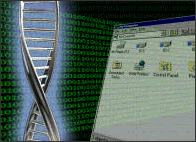In the digital age that we live in, with our supercomputers, terabyte hardrives, googlebyte servers and phones that can store multiple gigabytes of data, can we really know how much information there is in the world. In a recent study that will be appearing in Science Express a research team has set about calculating how much information mankind is able to store, compute and communicate. Looking at both digital and analog devices, the research team calculated that mankind is able to store a minimum of 295 exabytes of information. That's 315 times all the grains of sand in the world. What has revolutionised storage capacity is the shift from analog to digital, since 2007 ninety-four percent of all memory is stored in digital format. In 2007 1.9 zettabytes of information was transferred through televisions, GPS etc. and 65 exabytes of data was transferred through phone-calls, thats the equivalent of every person in the world reading 180 newspapers everyday. In 2007 all household computers in the world computed 6.4x 10^18 instructions per second. If we were to write out these same instructions ourselves it would take 2200 times since the Big Bang or 2200 times 13.5 billion years.
Okay so what do we get from all this. Yes computers are very powerful and they are very good at storing things and computing things but compared to their nearest rival nature they are still light years behind. For example all that memory that I outlined before, the 295 exabytes is still only 1% of the information that is stored in all the DNA in a human body. Nature is still the ultimate computer but how long will it be before a man made device exceeds it and what will be the implications. MRHP cannot wait to to find out.



No comments:
Post a Comment